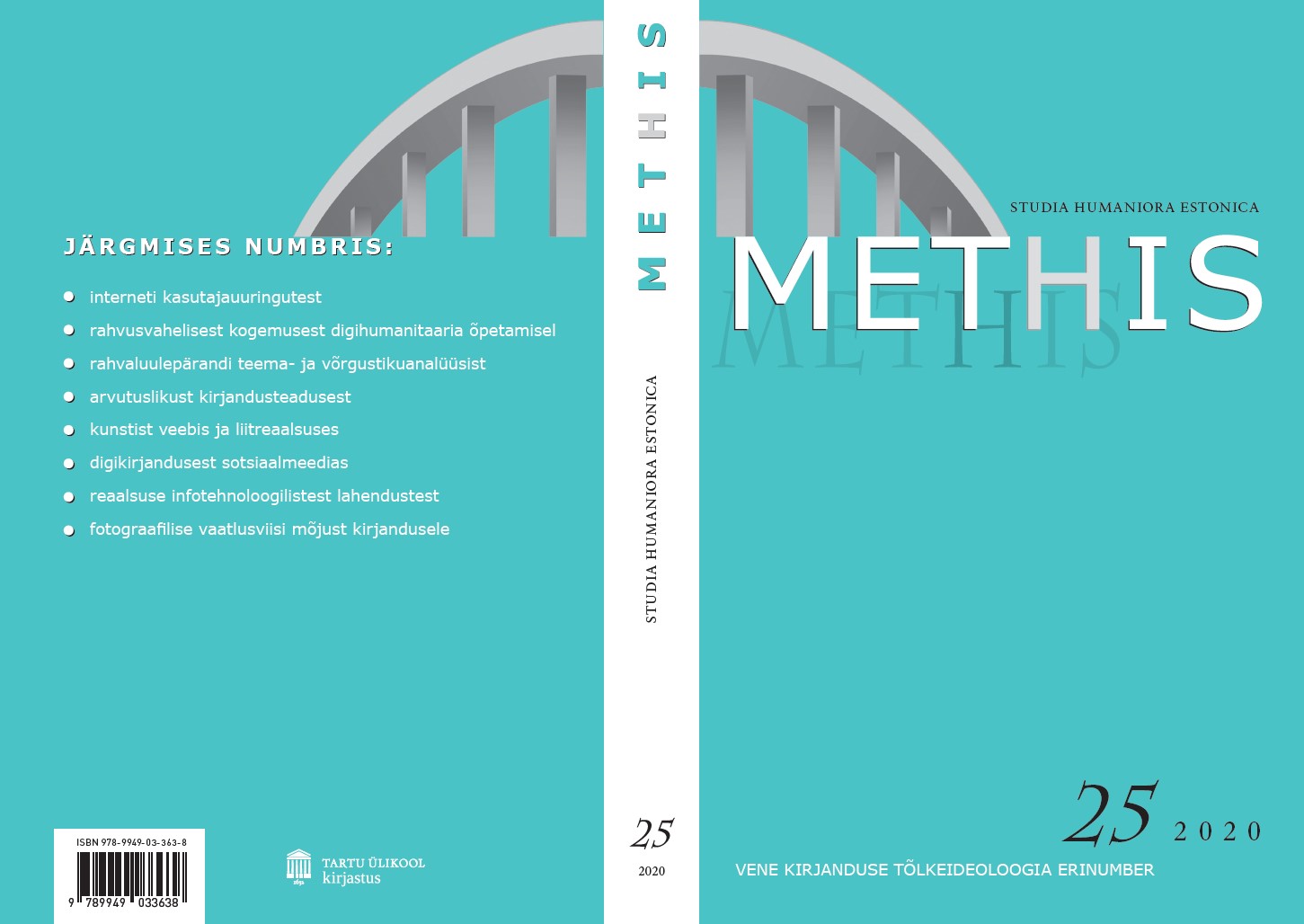Johannes Aavik ja vene kirjandus: biograafiline ja kultuurilis-ideoloogiline kontekst / Johannes Aavik and Russian Literature: Biographical, Cultural and Ideological Contexts
DOI:
https://doi.org/10.7592/methis.v20i25.16566Keywords:
Johannes Aavik, keeleuuendus, ilukirjanduse tõlge, eesti-vene kultuurikontaktid, Fjodor Dostojevski, programme of “linguistic renewal”, literary translation, Estonian-Russian cultural contacts, Fyodor DostoyevskyAbstract
Johannes Aaviku ilukirjanduslikud tõlked täitsid tema jaoks eelkõige rahvuskeele uuendamise rolli, seetõttu jäid originaali stiil ning autori väljendusvahendid tema enda keeleuuenduste taustal tagaplaanile. Ent tõlgitavate teoste valik oli tingitud eluloolistest ning kultuurilis-ideelistest teguritest, mille rekonstrueerimine ongi siinse artikli uurimisobjektiks. Eesti ja vene kultuuri vahekorra spetsiifika 20. sajandi esimesel veerandil tingis Aaviku pöördumise nimelt vene kirjanduse retseptsiooni poole. Nagu artiklis näidatud, oli see komplitseeritud seostes tolleaegse kultuuri ja poliitilise olukorraga Eestis.
This article examines Johannes Aavik’s relationship with Russian literature as a translator and as a reader. It provides a description of the general traits of Aavik’s literary translations: for Aavik, they served primarily as a tool for the renewal of his first language – Estonian, so he was less concerned with the style and poetics of the originals than with his own linguistic innovations. However, his selection of texts for translation was conditioned by biographical, cultural and ideological factors, which this article attempts to reconstruct. The specific relevance of the relationship of the Estonian and Russian cultures in the first quarter of the 20th century prompted Aavik to choose Russian literature. As the article demonstrates, this had complex ties with the cultural and political situation in Estonia at the time.
Aavik was highly critical of Estonian literature’s contemporary status and considered renewal of the literature to be one of the tasks of linguistic renewal. He was certain that his linguistic work and translations would set Estonian literature on the right path and contribute to the development of national self-consciousness. As part of Aavik’s linguistic utopia, he published the book series “Hirmu ja õuduse jutud” (Tales of Fear and Terror, 1914–1928) which included translations from various literatures, including Russian.
Aavik became familiar with Russian culture at the time of Estonia’s forced Russification when all schools had to adopt Russian as the language of instruction. After a short period of studying ancient languages at the University of Tartu, Aavik was obliged to continue his education at the Nizhyn Pedagogical Institute (Ukraine), which did not contribute to the development of his interest in Russian culture. To the contrary: in those years and in those following, he was most interested in French and Finnish culture, although he was also familiar with both classic and contemporary (modernist) Russian literature.
After Estonia gained independence in 1920, the time arrived for a re-assessment of the national intelligentsia’s relationship with Russian culture. Aavik was consumed by his project of large-scale renewal of the Estonian language, and he saw literature in general as a tool for the promotion of his ideas. He loved thrillers and assumed that these would attract a mass readership – thus, he chose works by authors such as E. T. A. Hoffmann, Friedrich Schiller, Gustav Meyrink, Ambrose Bierce, Arthur Conan Doyle, Guy de Maupassant, Prosper Mérimée, Auguste Villiers de l’Isle-Adam, Juhani Aho and Rodolf Toepffer for translation and publication in the “Tales of Fear and Horror” series. The Russian authors included in the series were primarily classics such as Alexander Pushkin, Nikolay Gogol, Mikhail Lermontov, Ivan Turgenev, Fyodor Dostoyevsky, and Aleksei Kuprin, but the texts chosen were not those traditionally represented in school curricula. The majority of the translations were done not by Aavik himself, but rather by his students (he taught at a school for several years), while Aavik was responsible for choosing the texts, editing the translations as per the programme of “linguistic renewal”, and preparing afterwords and commentaries.
This article examines in closer detail a translation made by Aavik himself and, in part, by his former classmate, the priest Vladimir Paivel – several fragments from Fyodor Dostoyevsky’s novel Crime and Punishment. It argues that Aavik’s translation does not fit into the classification of “domestication vs. foreignization” in translation, as the translator was mostly concerned with the linguistic and stylistic aspects of the Estonian text, not with the original. In the process of translation, the “language machine” (as Aavik termed it) reworked foreign material, making it “its own” – a part of its own mechanism. Thus, the national origin of literary material became a factor of little importance. This is especially notable in view of the fact that Aavik considered literature to have a direct link with political processes. He held the opinion that the level and main vectors of literary development served as indicators of the status of national sentiment and directly influenced the political life of the nation. The article provides numerous examples of such judgements which are first and foremost based on Russian material. Aavik saw a direct link between the work of Dostoyevsky and the formation of revolutionary sentiments in Russia, and between Russian modernist poetry and the social explosion in the late 1910s. It can be claimed that he considered Russian “literature-centredness” to be among the causes of the revolution. However, this did not keep Aavik from holding Ivan Turgenev’s literary work in the highest regard, and he even worked on translations of Turgenev in Tallinn during the Soviet occupation in 1942–1943, as well as in his later years of emigration in Sweden.


